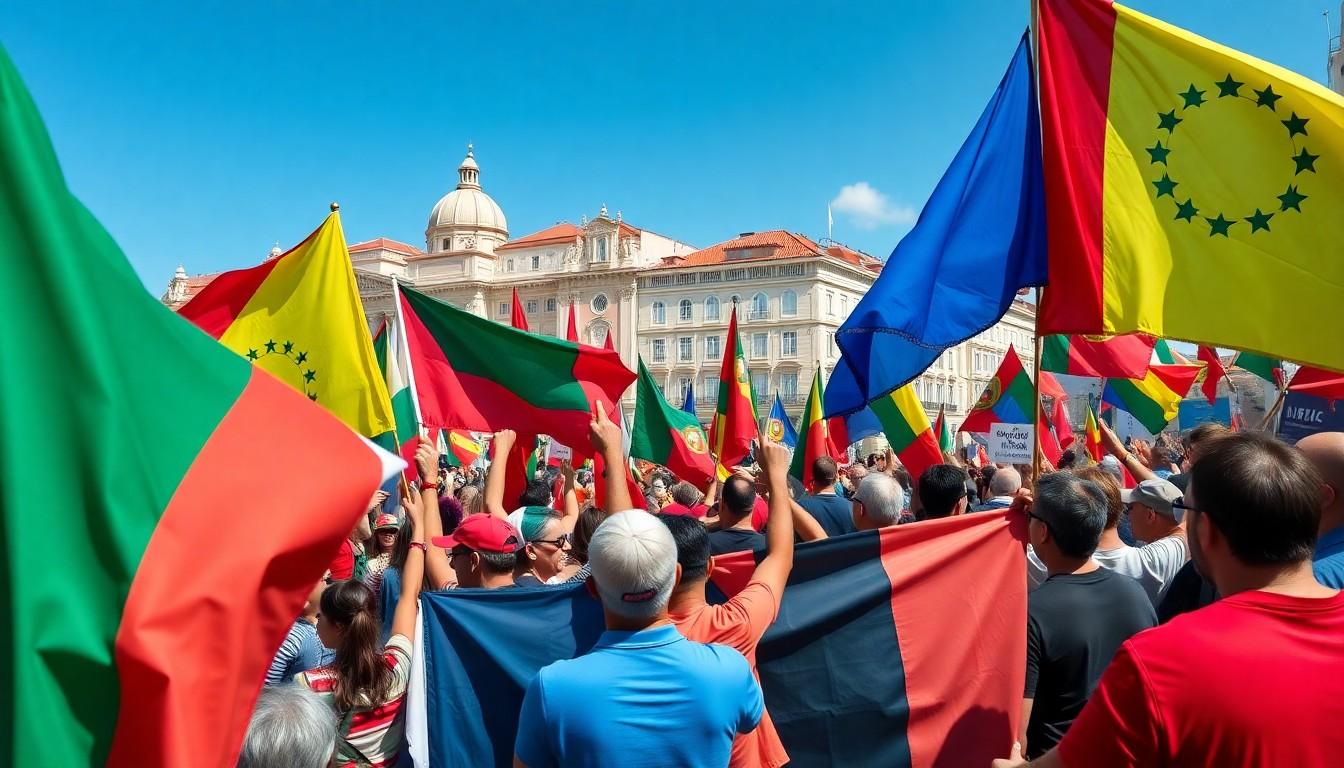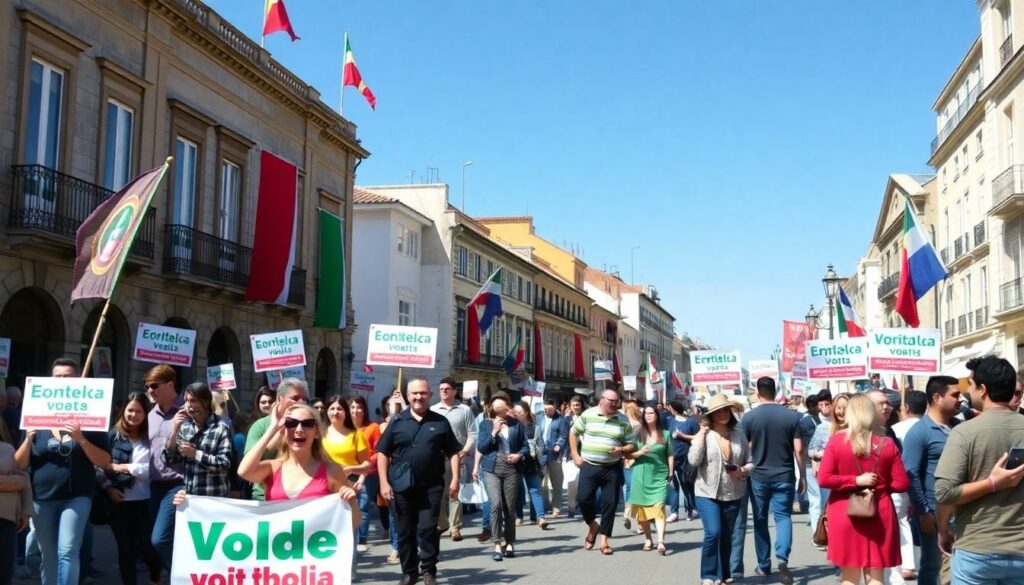Portugal’s elections are more than just a political event; they’re a vibrant spectacle that can make even the most stoic observer crack a smile. With a rich history of passionate debates and colorful campaigns, the Portuguese electorate is ready to shake things up once again. As candidates vie for attention, they often resort to creative antics that can rival any reality show, making the political landscape both entertaining and enlightening.
Table of Contents
ToggleOverview Of Portugal Elections
Portugal’s elections showcase a vibrant political culture that captivates both locals and observers. Citizens engage in passionate debates, reflecting diverse opinions on vital issues. Candidates develop unique campaign strategies aimed at resonating with the electorate, often leading to creative and lively presentations.
Voter participation remains robust in Portugal, with recent elections seeing turnout rates exceeding 70%. This active engagement underscores the public’s commitment to influencing governmental decisions. The electoral system, a combination of proportional representation and majority voting, encourages a multi-party landscape. This diversity fosters intense competition and dynamic dialogues among candidates.
Election cycles, typically occurring every four years, see various political parties contesting for seats in the Assembly of the Republic. Major parties like the Socialist Party and the Social Democratic Party dominate, but smaller parties significantly impact policy discussions. Independent candidates also contribute to the electoral mix, offering fresh perspectives.
Pre-election campaigns highlight key issues, such as the economy, healthcare, and education. Debates feature prominently, allowing candidates to articulate their positions while facing off against opponents. Social media has become an influential tool for reaching voters, with candidates utilizing platforms to share messages and engage with constituents.
Voting in Portugal occurs on Sundays, facilitating greater voter turnout. Polling stations are widely accessible, ensuring that all registered voters can participate. Following elections, extensive analysis of results offers insights into voter behavior and party performance, shaping future political strategies.
Key Political Parties In Portugal

Portugal’s political landscape features diverse parties that shape the electoral process and policies.
Major Parties and Their Platforms
The Socialist Party (PS) emphasizes social equity and economic growth, advocating for welfare reforms and public investment. In contrast, the Social Democratic Party (PSD) focuses on fiscal responsibility and market-driven solutions, aiming to promote entrepreneurship. The Left Bloc (Bloco de Esquerda) advocates progressive social policies, pushing for human rights and environmental sustainability. Meanwhile, the Portuguese Communist Party (PCP) champions workers’ rights and nationalization of key industries. Each party’s platform reflects distinct priorities that resonate with various voter demographics.
Emerging Political Movements
Emerging political movements in Portugal signify a shift in the electoral landscape. The Chega party appeals to voters frustrated with traditional politics, emphasizing anti-establishment rhetoric and stringent immigration policies. Additionally, the Liberal Initiative (Iniciativa Liberal) promotes economic liberalization and privatization, attracting supporters who favor minimal government intervention. These newer parties introduce fresh perspectives and challenge established norms, influencing elections significantly. Political engagement from younger voters drives their momentum, reflecting a demand for change in the political discourse.
Election Process In Portugal
Portugal’s election process embodies a structured approach that ensures democratic representation. The country conducts elections periodically, allowing citizens to engage in shaping their government.
Voting System Explained
Portugal employs a mixed electoral system that combines proportional representation with majority voting. This system allows voters to select representatives based on party lists in a proportional manner, promoting multi-party dynamics. Major parties like the Socialist Party and Social Democratic Party dominate, yet smaller parties and independents also contribute significantly to the political landscape. Voter turnout frequently exceeds 70%, demonstrating strong public engagement in the democratic process. Elections occur on Sundays to facilitate access, ensuring that citizens participate actively in voting. Each election cycle encompasses both legislative and presidential elections every four years, reinforcing accountability and representation within the government.
Role of the Electoral Commission
The Electoral Commission, known as the Comissão Nacional de Eleições (CNE), oversees the election process in Portugal. Independent in nature, it ensures fair practices and compliance with electoral laws. Their responsibilities encompass organizing elections, monitoring campaign financing, and ensuring transparency throughout the electoral process. The commission also educates voters on their rights and obligations, fostering an informed electorate. By promoting electoral integrity, the CNE plays a crucial role in maintaining the democratic principles that underpin Portugal’s political system. Regular audits and assessments conducted by the commission help adapt to challenges and improve future elections.
Recent Election Results
Portugal’s elections reflect the active engagement of its citizens and the dynamic nature of its political landscape.
Analysis of Voter Turnout
Voter turnout consistently exceeds 70 percent, illustrating strong public participation. High engagement in recent elections highlights a significant interest in governance among citizens. Turnout rates serve as indicators of political engagement and reflect the public’s commitment to influence decision-making processes. Various factors, including accessibility of polling stations and the scheduling of elections on Sundays, contribute to these impressive turnout figures. Citizens’ dedication to participating in the electoral process emphasizes the importance of their votes in shaping the future of their country.
Significant Outcomes and Trends
Recent elections reveal notable shifts in party dynamics and voter preferences. The Socialist Party (PS) maintained a strong position, capturing a significant share of the vote. Meanwhile, the Social Democratic Party (PSD) faced challenges in appealing to a changing electorate. Emerging parties like Chega and the Liberal Initiative attracted increased support, indicating a demand for diverse options in political representation. Trends show younger voters gravitating towards parties advocating for innovative policies, thereby reshaping the political narrative. Additionally, debates centered on pivotal issues such as the economy and healthcare influenced voter decision-making. These outcomes offer insights into the evolving landscape of Portugal’s political climate.
Portugal’s elections stand as a testament to the nation’s vibrant democracy and active civic engagement. The dynamic interplay of established and emerging parties reflects a political landscape that’s constantly evolving. Voter enthusiasm remains high as citizens passionately engage in discussions about critical issues shaping their future.
The role of social media continues to grow, allowing candidates to connect with voters in innovative ways. As younger generations demand fresh perspectives and progressive policies, the political discourse in Portugal is likely to become even more diverse and inclusive. This ongoing transformation promises to keep Portugal’s electoral process lively and relevant, ensuring that the voice of the people remains at the forefront of governance.





